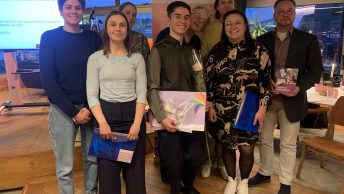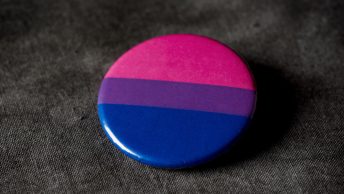
IHLIA Research has found another (future) scientist who will write blogs about LGBTI research. This time it’s Jang Kapgen, a Media & Culture student at the University of Amsterdam who is doing a minor in Gender and Sexuality Studies.
His blogs will be about academic frameworks that he wants to make accessible to a wider (general) audience. This is his first contribution:
Just to keep all the gender philosophers and queer theorists from nitpicking this review, this piece is actually written by a student. You may be wondering now: Why should I care about a student’s review? The answer is as easy as obvious: Because most people are no philosophers or gender theorists.
However, contemporary academic concepts need to be understood by non-academically trained people too in order to dismantle social hierarchies. Thus, these reviews have the main aim to make academic frameworks accessible without all the theoretical complexications of academia, so that everyone can work with these concepts. With that being said, enjoy the read!
Feminist Epist. Feminist Epismo. Feminist E-PIS-TE-MO-LO-GY… ok, that was a mouthful. But, now that we have that first hurdle behind us – just pronouncing that tongue twister – let’s dive into why you should know about epistemology, the theory of knowledge, and how its dominant understanding actively hurts queer people around the world.
Which image pops up in your head if you think about a scientist? It is quite likely that your answer is a white middle-aged man with some geeky glasses or an old white man with a long white beard.
While these are stereotypes with their own complications, these images still reflect how the majority of European and American academia looks like: white, male and (sous-entendu) heterosexual, able-bodied, cis-gendered and so forth. And that’s where the issue starts, because it is exactly these scientists who decide what knowledge is – Weird statement, I know, but let me explain.
The Issue of White-Male dominated Academia
While some people might not see the issue of the lacking diversity, the implications of this white- male-dominated academia are visible throughout history.
The violent history of research about race, gender and sexuality showcases how science is not so much informed by a so-called objectively perceived reality, but by social hierarchies.
A good example is the scientific distinction between a man and a woman. The female and male distinction has not been as clear as you might think throughout European thought. Science actually switched from a rather fluid understanding of manhood and womanhood (= man and woman have the same body besides inside-out reproductive organs) to a system of rigid distinction (= even molecules of women were interpreted as fundamentally passive in contrast to men’s as productive) during the enlightenment (Laqueur 1992, 6).
This science legitimized gender roles of women as compliant and men as active. And now guess who profited from this science and guess who were the scientists.
But there are far more contemporary examples, such as the ‘biology’ of the egg and sperm cells. Take a moment to reflect: How do you imagine that both function? And where did you get that information from?
At least my sex education defined the sperm as active and fierce, while the egg cell awaits its conquerer. But (I wish I could say recently, but since the 1990s) there is a counter-argument going-on that the sperm is actually passive throughout procreation and that the egg cell is actively moving towards the sperm and is highly selective while choosing the right sperm cell.
According to Emily Martin, researchers did just interprete egg cells and sperms within gendered expectations (1991, 485). Again, guess who profited from this science and guess who were the scientists.
Rejecting Science – or is there a compromise?
In this discussion, epistemology is the central ground of debate, as it is the theory of knowledge production and validation. Questions such as “Why do I believe this information?” or “When is a scientist trustworthy?” are within the field of epistemology.
Some feminist and queer thinkers argue to reject science altogether due to its history of inviting oppression and violence. Others are looking for compromises.
Donna Haraway proposes one of these compromises. In order to fully understand her concept, we need to row back to explain her understanding of current European and American academia.
‘Scientists are bad’ is definitely not her claim. Haraway, however, claims that scientists have been wrongfully framed as objective observers of reality – Simply speaking, that we think they know things.
She explains this dilemma through the “god trick” metaphor (Haraway 1998, 581-582). Researchers claim to see their object of research (whatever it may be, from sexuality and gender to biology and chemistry) from all perspectives – quite godlike – and to be able to extract facts about the object.
But, highlighting the term “trick” within Haraway’s metapher, this remains just an illusion. The researcher might be able to tell a truth about an object – but, now comes the important part, only from their point of view. The researcher does not obtain an invisible, god-like status, but becomes an acknowledged, biased agent while conducting research.
Haraway, thus, calls for “situated knowledges” (1998, 581). Researchers should stop claiming that they can discover universal facts and should acknowledge their own perspective. A man might interpret a sperm as active, but this is only from his own perspective.
To put it very clearly: By saying “This information is coming from a man’s perspective and we need other perspectives too in order to fully grasp the object of research”, we can come closer to actual universal truths.
Feminist Epistem. Feminist Epist. Feminist Epistemologies are a complex topic of philosophical and theoretical debate, but affecting us all. Diversity might be a good step into the right direction – Acknowledging all our own biases and seeking out people with different perspectives.
But this does not only apply to academia but to everything from economy to politics to activism.
Jang Kapgen (he/him) is a Media and Culture BA student at the University of Amsterdam doing a minor in Gender and Sexuality Studies. Over the course of his studies, a main interest became how to make academia accessible, especially queer and feminist theory. His blog post series thus elaborates on the intersections of academia and lived experiences – from a students perspective, aiming to create a bridge between complex theory and the everyday.
Bibliography
Haraway, D. (Donna). 1988. “Situated knowledges: The science question in feminism and the privilege of partial perspective”. Feminist studies. 14 (3): 575-599.
Laqueur, T. (Thomas). 1992. “Of language and the flesh”. Making sex, body and gender from the Greeks to Freud. 1-24. Cambridge: Harvard University Press. Martin, Emily (1991). “The Egg and the Sperm: How Science Has Constructed a Romance Based on Stereotypical Male Female Roles”. Signs. 16 (3): 485 – 501.
Further recommended Readings
Harding, S. G. (Sandra). 1991. “Introduction”. Whose science? Whose knowledge?: Thinking from women’s lives. 1-18. Ithica: Cornell University Press.
Hill Collins, P. (Patricia) (2000). “Black Feminist Epistemology”. Black Feminist Thought, Knowledge, Consciousness, and the Politics of Empowerment. 251-273. London/New York: Routledge.







